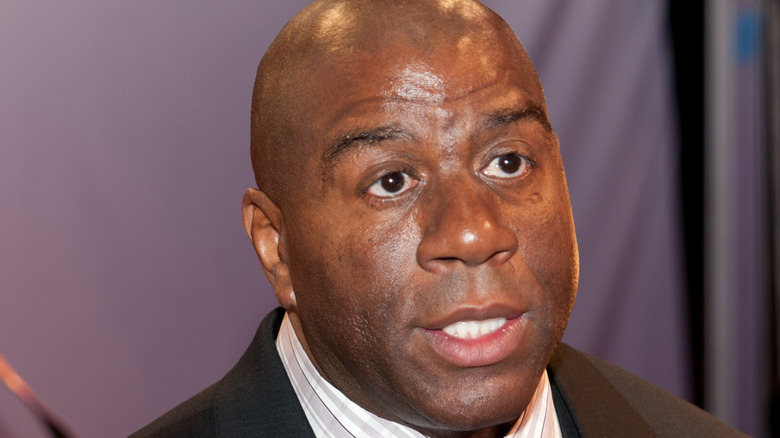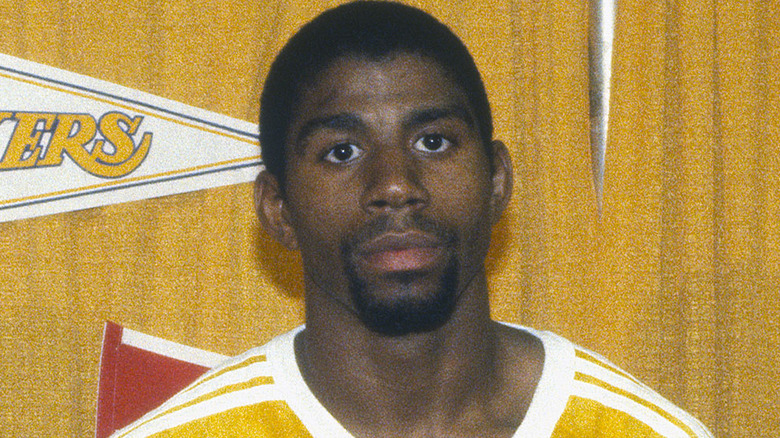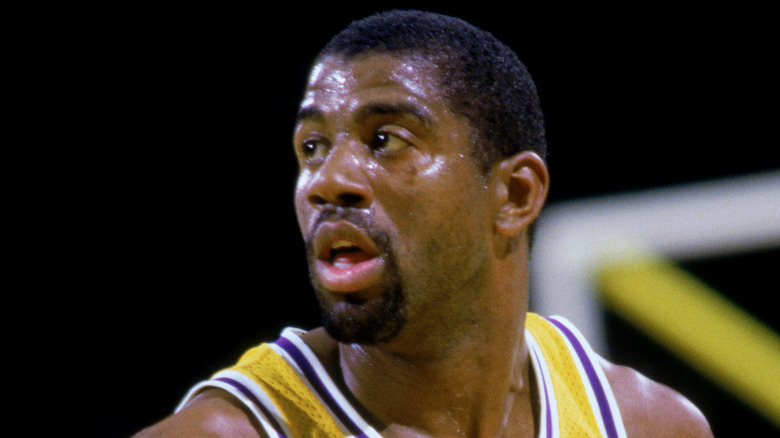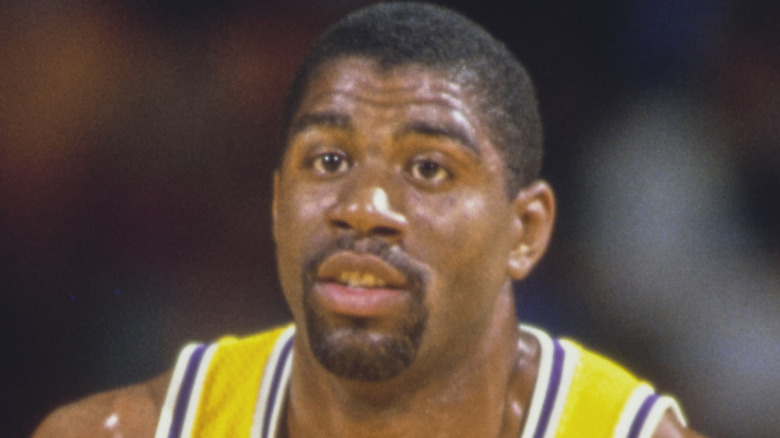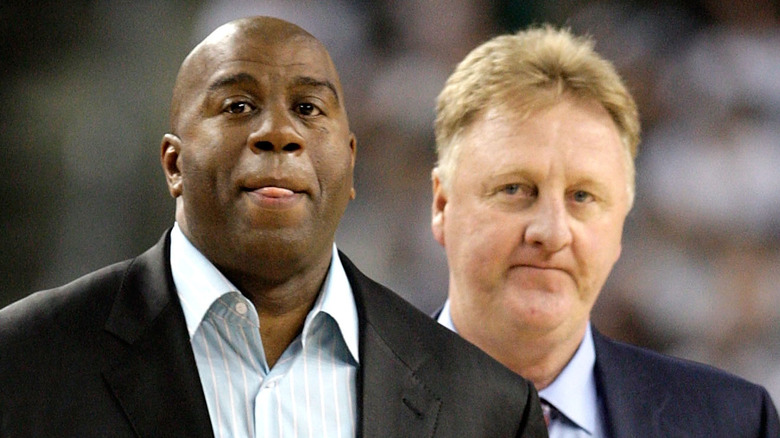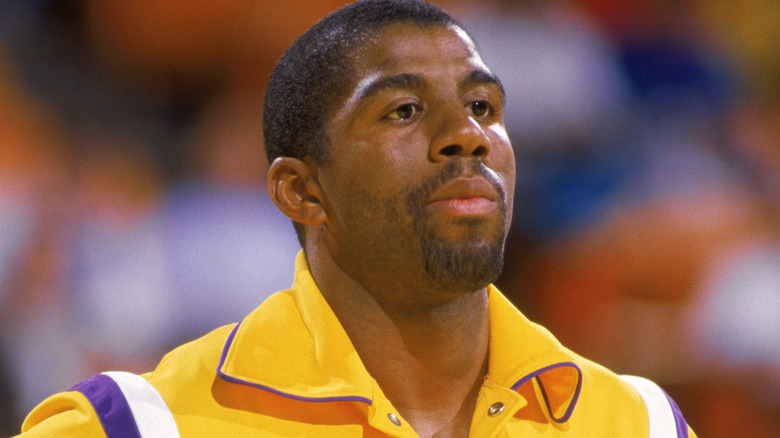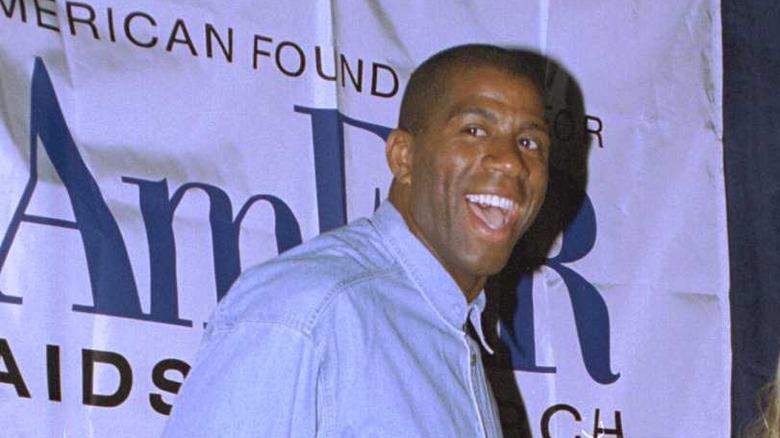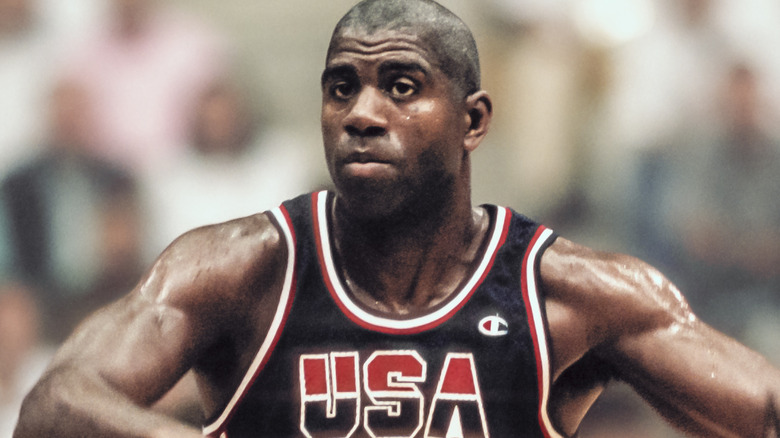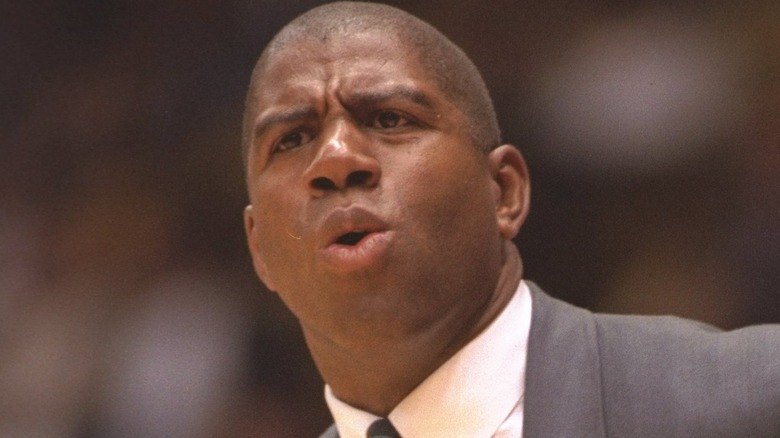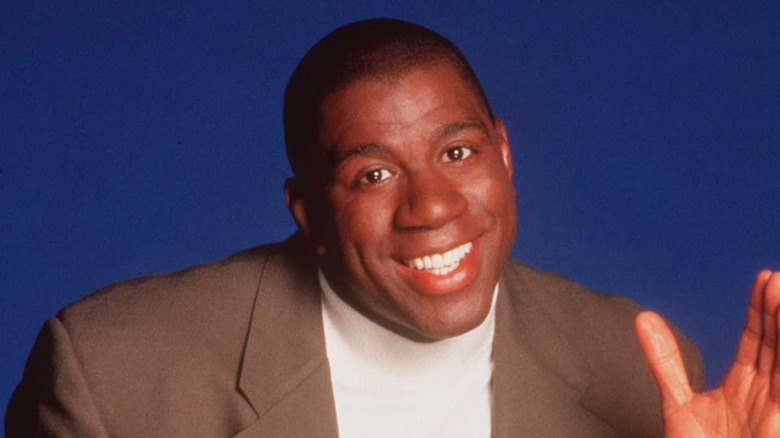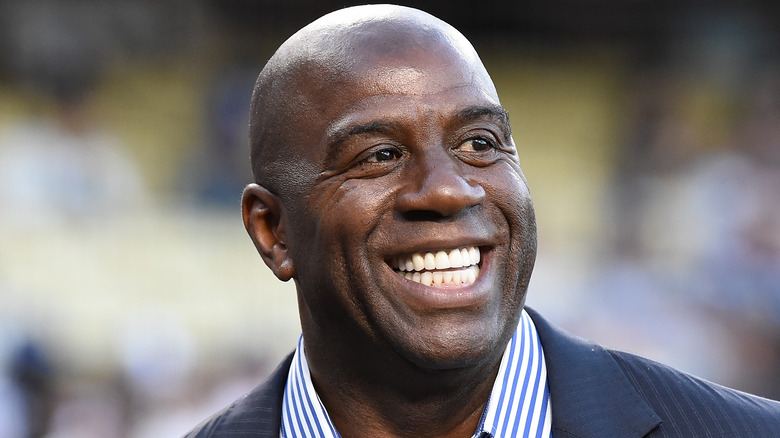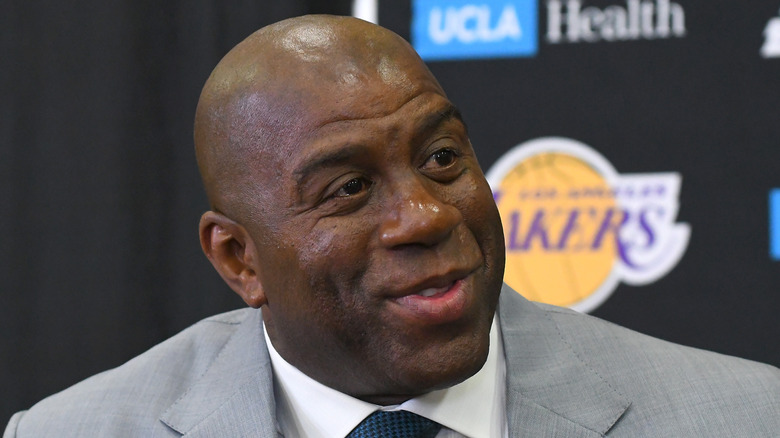Magic Johnson and Larry Bird David Letterman Art 2
What Fans Might Not Know Nigh Magic Johnson
Information technology'due south pretty much undeniable that Magic Johnson is 1 of the very best of the very best professional basketball game players of all time. A Naismith Memorial Basketball Hall of Fame inductee and named to the NBA'southward 75th Ceremony Team, the point guard dominated basketball in the 1980s, winning five championships, three Nearly Valuable Actor Awards, and was elected to twelve All-Star teams. Beyond that, he helped brand pro basketball game a mainstream sport worthy of primetime Television and the public'due south attention, a key part of the flashy, Hollywood-embracing "Starting time" era of the Los Angeles Lakers.
Johnson was so skilled — and for then early in his career, and for and then long — his fame transcended sports. He was a well-known public figure and glory effectually the world, and his influence on sports, media, business concern, and public wellness sentiment — in the wake of his 1991 announcement that he'd contracted HIV, the virus that causes AIDS — are still felt two decades later his retirement, leading to shut test in projects like HBO's "Winning Time" and the Apple Boob tube+ documentary "They Call Me Magic." Hither's a similarly deep and splashy swoop into the long and fascinating life and career of the man they phone call Magic.
How Earvin Johnson institute Magic
"Magic Johnson" is one of the coolest, smoothest, and most appropriate athlete names ever, befitting the thespian who made going to the NBA Finals routine and who made no-look, behind-the-back passes await like shooting fish in a barrel. Unfortunately and unsurprisingly, that's not the man'due south real first name. His given name at nascency: Earvin Johnson, Jr.
Johnson acquired that magical moniker while he was playing at Everett Loftier School in Michigan in the 1970s. According to his NBA bio, an expanse sportswriter coined the nickname Magic after seeing the budding star, all of xv years old, score 36 points, xvi rebounds, and 16 assists in one game. The name rapidly stuck and was regularly used by pretty anybody from so on, with the exception of Johnson'south female parent, a deeply religious woman who thought that the term, with its connotations of sorcery and witchcraft, was ungodly. She at least had her son'due south childhood nickname to fall back on should she have liked. "I was chubby earlier I grew tall, and when I was young people chosen me June Problems," Johnson told the Seattle Times. "When they passed me with my basketball, I'd hear them say, 'There goes that crazy June Issues, hoopin' all day.'"
The death of a friend and teammate profoundly affected Magic Johnson
Co-ordinate to the Los Angeles Times, Magic Johnson'southward earliest and arguably most vocal champion was a babyhood friend named Reggie Chastine. A fellow playground baller in Lansing, Michigan, Chastine was teammates with Johnson at Everett Loftier School and got the future star thinking about being a future star, that achievements like all-country and All-American selections were possible, if not probable. "He was the beginning one who really believed in me. I doubted myself, simply he was looking to big things," Johnson said. "To take that sense of the large dream and that strongest, I needed that."
Johnson and Chastine didn't go to play their senior year together. During the summer before that flavour started, 16-yr-sometime Chastine was driving in his car when some other motorist ignored a terminate sign, ran into his vehicle, and killed him. Decades afterwards, according to Sports Illustrated, the tragedy still literally haunted Johnson. In the period after he learned he had HIV and temporarily retired, Johnson experienced a recurring dream in which he and Chastine were playing basketball, and Chastine would convince Johnson that information technology wasn't even so his time to join him in the afterlife.
Magic Johnson threatened to leave the Lakers and got the coach fired instead
With the number ane selection in the 1979 NBA Typhoon, the Los Angeles Lakers selected college-title winning Michigan Country star Earvin "Magic" Johnson. The option paid off immediately. Among the accolades and achievements in Johnson'south first three years in the NBA: a spot on the 1980 All-Rookie squad, two All-Star game appearances, and ii NBA championships. Only in 1981, toward the finish of that menstruum, Johnson was securely unhappy with the squad where he'd eventually be a franchise player, omnibus, and executive. Co-ordinate to Jeff Pearlman's "Beginning," Coach Paul Westhead, head of the Lakers' on-court operations since Johnson joined the NBA in 1979, decided to alter the team'south arroyo and built an offense around tried-and-true superstar Kareem Abdul-Jabbar, resulting in less touches and responsibility for Magic.
Johnson was so displeased that he asked possessor Jerry Buss to flat-out fire Whitehead. Buss refused, and in a "if he doesn't go, I get" situation, Johnson requested a merchandise to another squad. Taking that as an ultimatum, Buss took one day and so fired Westhead, replacing him with Pat Riley.
How his rivalry with Larry Bird turned into a friendship
Larry Bird vs. Magic Johnson was the preeminent NBA rivalry of the 1980s, with the professional feud predating and extending beyond just those two players. Bird played for the Boston Celtics and Johnson for the Los Angeles Lakers, teams that were intense opponents since the early days of the NBA, facing off in the league finals vii times before both athletes' pro careers began in 1979 — a few months after the two played ane some other in the NCAA championship game. (Johnson'southward Michigan State defeated Bird'southward Indiana Country.)
Bird and Johnson would confront each other as the leader of their squads oft during the 1980s, with the Celtics playing the Lakers in three NBA Finals during the decade. That relationship, both professional person and personal, was explored in the 2012 Broadway play "Magic/Bird," which both players promoted during an appearance on "The Late Show with David Letterman." Johnson revealed the moment that their respectful rivalry thawed into a friendship: on the set up of a 1986 Television set commercial for Antipodal shoes, filmed in Bird's hometown of French Lick, Indiana. "I got to know Larry the homo that solar day, and he got to know Earvin," Johnson said (via the New York Mail). Bird invited Johnson to join him at his childhood home for dejeuner, cooked past his mother, who greeted Magic on the porch and gave him a large, welcoming hug. They were pretty much close friends after that.
Magic Johnson inverse the game in big and small ways
While he brought enough of intangible benefits to pro basketball game, with his extremely entertaining manner of play a key office of the "Showtime" era Los Angeles Lakers of the 1980s, and bringing in countless new fans with his intense rivalry with the Boston Celtics' Larry Bird, Magic Johnson'south influence was additionally felt in basketball terminology and the NBA rulebook.
Johnson ranks third all-time in the statistical category of "triple-doubles." That refers to a game in which a histrion amassed double-digit totals in the divergent fields of scoring, rebounding, and assists. Johnson'south NBA predecessor Oscar Robertson racked up 181 triple-doubles, to Johnson's 138, simply when Robertson played in the 1960s and 1970s, nobody ever chosen his achievement by that proper name. Johnson tripled-doubled so regularly that the basketball community took notice, according to the NBA, and a phrase was coined in his honour.
Organized basketball, at the professional, college, and high school levels, co-ordinate to The Morning time Call, follows a "blood rule," also known as the "Magic rule." Per the Orlando Sentinel, the NBA developed and enacted the policy in the early on '90s, post-obit Johnson's announcement that he had the viral, blood-borne illness AIDS, which necessitates a stoppage in play and the temporary sidelining of a histrion should they suffer a cut or drain out of an open up wound.
Magic Johnson helped inverse public perceptions about HIV
Prior to the start of the 1991-1992 season, Magic Johnson underwent a comprehensive concrete exam, co-ordinate to Ebony – standard procedure for a professional athlete. He was called away from a preseason game in Utah back to Los Angeles by team physician Dr. Michael Mellman, who delivered the news face-to-face: Johnson had tested positive for HIV. Soon thereafter, in Nov 1991, Johnson held a press conference in which he divulged his medical status to the earth, and that he would stride away from basketball equally a result. At that moment, according to CBS News, Johnson became the public face of HIV, one of the most prominent figures (and few professional person athletes) to announce that he was living with the virus that caused AIDS, the potentially fatal illness that at that bespeak in time was deeply frightening and not widely understood. "We have to remember at that time, people were actually dying of AIDS. I was simply scared to death," Johnson said.
Not long afterwards his diagnosis, Johnson sprung into activeness and embraced the advocacy role thrust upon him, meeting with major AIDS awareness advocate Elizabeth Glaser. "She fabricated me hope earlier she died that I would become the face of the disease and actually go out and help people and educate people about information technology," Johnson told PBS'due south "Frontline."
Magic Johnson frequently un-retired
Magic Johnson's NBA career seemingly came to an sharp and early on terminate in Nov 1991 after 12 seasons, upon his disclosure that he'd contracted HIV, the virus that causes AIDS. But neither the NBA, basketball fans, nor Johnson himself were quite ready for him to say goodbye to the game. In early 1992, and despite having not played in a professional game in nearly a year, Johnson was voted to the starting lineup of the NBA All-Star Game. He led the Western Conference to a 153 to 113 victory over the Eastward, scoring 25 points and nine assists and named the All-Star Most Valuable Player. A few months later on, with professional basketball players immune to compete in the Olympics for the kickoff fourth dimension, Johnson landed a spot on the U.s.a. men's basketball game squad, the so-chosen "Dream Team" that cruised to a aureate medal at the 1992 Summertime Olympics in Barcelona (via Sporting News).
Finally, halfway through the 1995-1996 season, four years after he retired from the NBA, Johnson made a full and proper return to the league. According to Lakers Nation, he played well in what would exist his final 32 games in the association, averaging xiv.6 points and 6.9 assists and was on the roster when the Lakers quickly lost to the Houston Rockets in the showtime round of the playoffs.
Magic Johnson took his talents to Sweden and Denmark
Every bit professional athletes approach age twoscore, most are thinking nigh retirement, if they haven't already wrapped up their careers. Magic Johnson had retired from playing in the NBA for the second and final time in 1996, right around his 37th altogether, but as his the big 4-0 approached in 1999, he decided to play with Magic M7, a team based in Boras, Sweden, that played in the Swedish Basketball League, according to the Associated Printing. In 2000, Johnson, playing well for the team and attracting crowds so large that the Magic M7 had to move games to bigger venues, signed a two-year contract (per the Washington Mail) — probable easily negotiated because Johnson was likewise an owner of the squad, making him i of the few owner-slash-players in basketball history.
Johnson ultimately played in just five games for the team renamed in his honor (it was previously chosen M7 Boras), simply emerged victorious in all of them, according to the AP. The arrangement fell autonomously, and Johnson walked away as both an owner and player (per SoloBasket), just within the year, the athlete had signed up for a stint with the Magic Keen Danes, a squad based in Copenhagen, Denmark.
His Lakers coaching stint was short-lived
Some of the near achieved coaches in NBA history are former players, promoted from careers as all-stars on the court to masterminds of guiding others to victory. Not amidst the pantheon of NBA stars turned legendary coaches similar Lenny Wilkens, Phil Jackson, and Doc Rivers: Magic Johnson.
The 1993-1994 season was a rare mediocre one for the dynastic, championship-collecting Los Angeles Lakers. Coach Randy Pfund guided the team to a poor 27 and 37 record (via NBA.com), and with the season non nevertheless over, team direction fired him, according to Basketball Network. His replacement: love, recently retired Lakers fixture Johnson, whom team general manager Jerry West idea would help improve the team and falling attendance figures. Neither metric improved. Johnson helped the team limp to the end of the flavour, and they were even worse than they were under Pfund. After winning 5 of his first vi games, Johnson coached the Lakers to 10 straight losses. He never led another NBA team, meaning he has a career coaching record of 5 and 11.
The Magic Hr barely lasted more than than that
In June 1998, 20th Century Television, according to the New York Times, debuted "The Magic Hour," a syndicated late-nighttime talk bear witness hosted by Magic Johnson and designed to compete with "The Tonight Show" and "The Tardily Prove with David Letterman." Critics were not kind to "The Magic Hour" or its host, however. "In watering itself down to appeal to mainstream white folks," wrote Ray Richmond in Diversity, "the show plays a trivial bit similar celebrity night at the Elks Lodge." Richmond said the prove was "cornball" and Jackson was a "wit-challenged" MC who irritatingly fawned all over his celebrity guests.
The about newsworthy outcome in the ultimately short history of "The Magic Hr" occurred when provocation radio personality Howard Stern came on as a guest and eviscerated Johnson in a racially-charged tirade," telling him to "loosen upward" and to "stop trying to talk like the white man" and "talk ebonics all you lot desire." He too tried to get Johnson to open up about the rumored sexual behaviors that led to his contracting HIV. "At least you had fun getting AIDS," Stern quipped. Johnson uncomfortably laughed at Stern'due south comments, hiding his true feelings. "I wanted to say something and hit him at the aforementioned time, on air," Johnson said in the 2022 documentary "They Phone call Me Magic" (via the New York Post).
Later just 2 months of dissemination to very modest audiences, 20th Century Television canceled "The Magic Hour."
Magic Johnson is a wildly successful entrepreneur
Magic Johnson parlayed the influence he developed and the fortune he amassed over more than a decade every bit an NBA superstar into a business portfolio that has made him one of the wealthiest men in the United States. According to Players Bio, Johnson's personal internet worth exceeds $500 million, and his company, Magic Johnson Enterprises, has a valuation of $1 billion. Per Business Insider, Johnson's empire started with the buy of 2 Pepsi bottling plants, and he directed the profits into shopping centers and Magic Johnson Theatres cineplexes, the latter of which he sold to Loews. He also worked out a l-50 turn a profit split with Starbucks to franchise 105 coffee shop locations into underrepresented, predominantly Black population centers.
But Johnson and so put his money where his passions truly lie: in sports. In 2012, according to NBC Los Angeles, he ponied up function of the $2.15 billion to become part of a group that purchased the Los Angeles Dodgers. He's likewise an possessor of the Los Angeles Football Social club, a Major League Soccer squad, and the Los Angeles Sparks of the WNBA.
Magic Johnson acrimoniously quit his Lakers chore
According to the Los Angeles Times, Magic Johnson's deep ties to the Los Angeles Lakers extended across his playing days. He purchased a stake in the Lakers, and then sold it off in 2010, but was listed as an honorary vice president until 2016, when, according to the NBA, he asked the team to remove his name from its ranks because he didn't want the public to recollect he was an active consultant. Less than a year later, the Lakers hired Johnson every bit an counselor, so about two weeks later that, per CBS Sports, Johnson was named president of basketball operations.
In that chapters, Johnson helped lure NBA superstar LeBron James, but failed in his attempts to bring other superstars to Los Angeles. Johnson'south forepart part role lasted for a little bit longer than two years, when in May 2019, he resigned from the job, according to the NBA. He told ESPN's "Showtime Have," that he quit after being told he could fire underperforming motorcoach Luke Walton, but so got word from possessor Jeanie Buss that he shouldn't. "I told them, when it's not fun for me, when I think that I don't have the decision-making power that I thought I had, then I've got to stride aside," Johnson explained, adding that Lakers GM Rob Pelinka's machinations fabricated it hard for him to practice the job that he was hired to do.
ackermannprall2001.blogspot.com
Source: https://www.grunge.com/849418/what-fans-might-not-know-about-magic-johnson/
